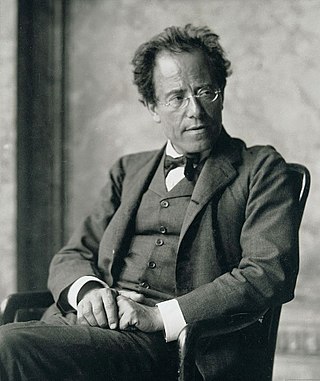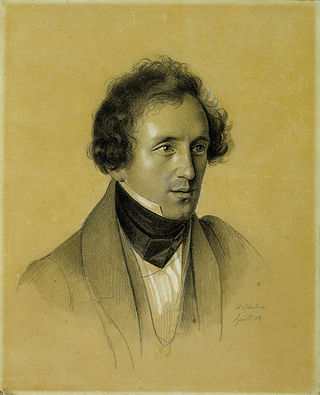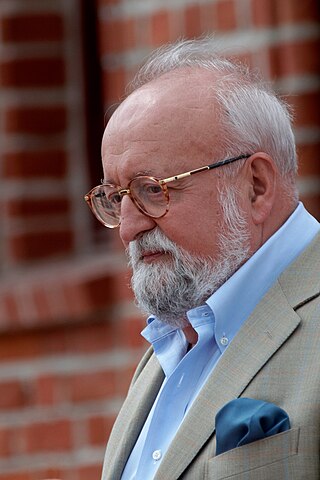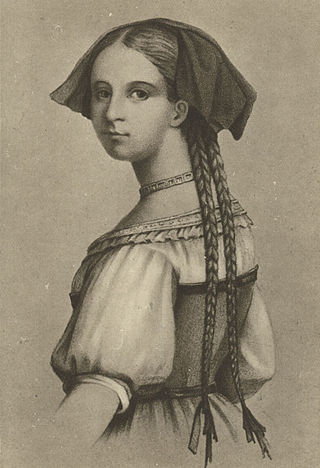
Johann Ludwig Bach was a German composer and violinist.

Das Lied von der Erde is an orchestral work for two voices and orchestra written by Gustav Mahler between 1908 and 1909. Described as a symphony when published, it comprises six movements for a large orchestra and two singers as the soloist alternating in the movements. Mahler specified that the two singers should be a tenor and an alto, or else a tenor and a baritone if an alto is not available.

Verklärte Nacht, Op. 4, is a string sextet in one movement composed by Arnold Schoenberg in 1899. Composed in just three weeks, it is considered his earliest important work. It was inspired by Richard Dehmel's poem of the same name and by Schoenberg's strong feelings upon meeting his future wife Mathilde Zemlinsky, who was the sister of his teacher, Alexander von Zemlinsky (1871–1942). Schoenberg and Zemlinsky married in 1901. The movement can be divided into five distinct sections which refer to the five stanzas of Dehmel's poem; however, there are no unified criteria regarding movement separation.
Hans-Friedrich Blunck was a German jurist and a writer. In the time of the Third Reich, he occupied various positions in Nazi cultural institutions.

St. Paul, Op. 36, is an oratorio by Felix Mendelssohn. The composer oversaw versions and performances in both German and English within months of completing the music in early 1836.

Ireen Sheer is a German-English singer. She had her first major hit in 1970 with Hey Pleasure Man. She had a top five hit on the German singles chart with "Goodbye Mama" in 1973. She went on to finish fourth at the Eurovision Song Contest 1974 representing Luxembourg, sixth at the Eurovision Song Contest 1978 representing Germany, and thirteenth at the Eurovision Song Contest 1985 representing Luxembourg again.

"Vater Unser, Part II " is the eighth single released by the German music project E Nomine, and appears on the 2004 album Das Beste aus... Gottes Beitrag und Teufels Werk. This tracks is a mix of 'Vater Unser' and 'Psalm 23' from "Das Testament" (1999).

"Prometheus" is a poem by Johann Wolfgang von Goethe, in which the character of the mythic Prometheus addresses God in misotheist accusation and defiance. The poem was written between 1772 and 1774 and first published in 1789. Friedrich Heinrich Jacobi published an anonymous and unauthorised version in 1785. It is an important work of the German Sturm und Drang movement.

The Symphony No. 8 "Lieder der Vergänglichkeit" by Krzysztof Penderecki is a choral symphony in twelve relatively short movements set to 19th and early 20th-century German poems. The work was completed and premiered in 2005. The symphony has an approximate duration of 35 minutes. Penderecki revised the symphony in 2007 by adding a few more poem settings and the piece has expanded to around 50 minutes. Although given the designation Symphony No. 8, it was not actually the final symphony Penderecki completed before his death in March 2020; the Sixth Symphony, begun in 2008, was not completed until 2017.
Dimitar Janakiew Inkiow was a Bulgarian writer.

"Heimliche Aufforderung", Op. 27, No. 3, is one of a set of four songs composed for voice and piano by Richard Strauss in 1894. The German conductor Robert Heger orchestrated it in 1929. The text is from a poem in German by John Henry Mackay.

Vox Christi, Latin for Voice of Christ, is a setting of Jesus' words in a vocal work such as a Passion, an Oratorium or a Cantata. Conventionally, for instance in Protestant music of the Baroque era, the vox Christi is set for a bass voice.
The 66 Chorale improvisations for organ, Op. 65, were composed by Sigfrid Karg-Elert between 1906 and 1908, and first published in six volumes in 1909. The composition was dedicated to "the great organist Alexandre Guilmant".

"Welcome and Farewell" is a poem by Johann Wolfgang von Goethe from the collection Sesenheimer Lieder. It was published for the first time in 1775 in the women's magazine Iris. Franz Schubert set it to music as a lied (D.767).
Franz Schubert's best-known music for the theatre is his incidental music for Rosamunde. Less successful were his many opera and Singspiel projects. On the other hand, some of his most popular Lieder, like "Gretchen am Spinnrade," were based on texts written for the theatre.
Bach's first cantata cycle refers to the church cantatas Johann Sebastian Bach composed for the somewhat less than 60 occasions of the liturgical year of his first year as Thomaskantor in Leipzig which required concerted music. That year ran from the first Sunday after Trinity in 1723 to Trinity Sunday of the next year:

![Johann Wolfgang von Goethe (portrait by Georg Oswald May [de], 1779 Johann Wolfgang Goethe, 1779.png](http://upload.wikimedia.org/wikipedia/commons/thumb/1/1e/Johann_Wolfgang_Goethe%2C_1779.png/220px-Johann_Wolfgang_Goethe%2C_1779.png)










